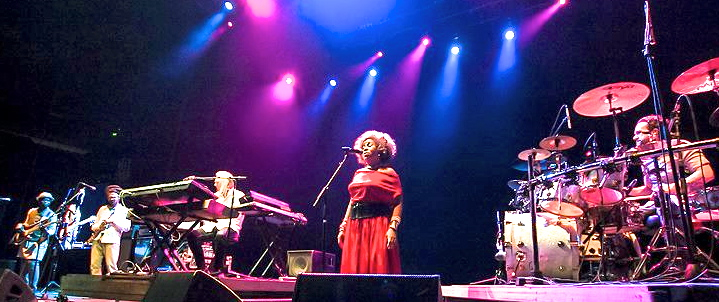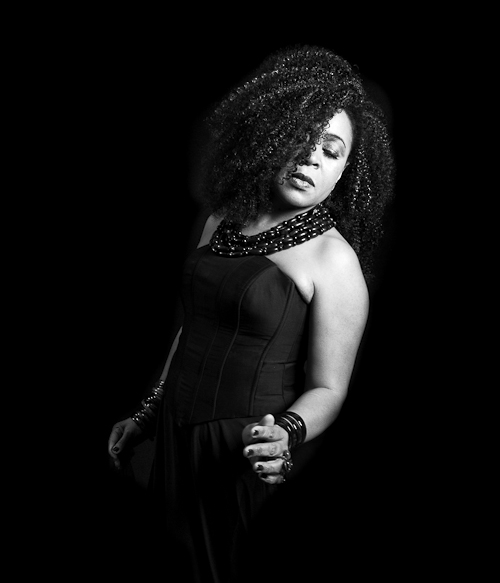Monika Njava
The voice of Madagascar
Haizina (Darkness)
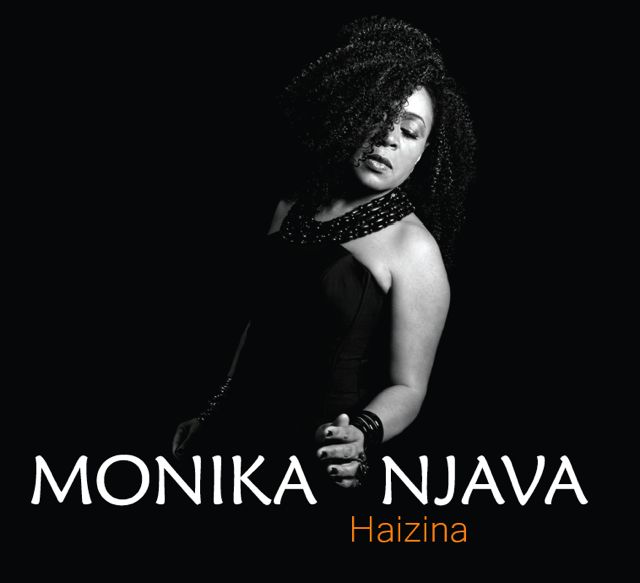
Ravola
The power of money (ravola) prevails over everything, even a heart that loves.
Mampirafy
Women who live with a violent and jealous husband in polygamy (mampirafy) must regain their liberty, even when it means facing financial hardship.
Reolo
Victims of corruption and injustice, the people (reolo) demand freedom of expression.
Tambanivolo
A peasant (tambanivolo) in love with a city woman thinks she doesn’t like country life. He’s mistaken: the reason she doesn’t visit is because she’s married. (Gilberto Moravalo, guest vocal)
Tomany
I’m weeping (tomany) about a close family that is tearing itself apart through jealousy and leaving the family home as sad as a haunted house.
La vie
To survive an old woman collects the coffee beans left on the ground after the harvest. Why this injustice? That’s life.
Sahira
The difficulty (sahira) of the Antandroy people: drought, no harvest, uncaring politicians. People eat sand in place of rice. Youths kill for one franc. (Remanindry, guest vocal)
Jiny Karo Karo
A young woman dreams of wearing plaid jeans (jiny karo karo), suffering because she doesn’t have the means to buy them.
Mieritsereta
Reflect (mieretsreta) on environmental destruction, the looting of natural resources and the foreigners who reap the rewards. Slavery continues.
Bemola
An ambitious country girl tells her parents she wants to leave the village to find another life in the capital. The whole village thinks she is crazy (bemola).
International Women’s Day concert
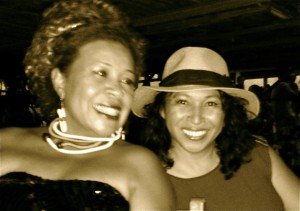
Monika & Bodo
Every year Madagascar holds its official celebration of International Women’s Day in a different city. The 2015 edition took place in Toliara on the southwest coast. Facing the African continent across the Mozambique Channel, it also happens to be the home turf of Monika Njava.
In addition to conferences and displays of traditional attire and dance, this year’s event included a spectacular concert held at Toliara’s seaside park. No surprise that Monika was on the bill, alongside Malagasy musical stars Dama, Theo, Bodo, Tsiliva and Stéphanie.
From the stage, a tropical technicolor sunset lit up eager faces as far as the eye could see. It seemed all of Toliara was there to enjoy the free Sunday evening show. In addition, a raised VIP stand held a large number of dignitaries, including local and national government officials up to the ministerial level, and representatives of international organizations.
Outspoken artist
Monika chose her repertoire with care: every song had a social or political message that resonated with the public. For example, In the middle of her set she brought the legendary Remanindry onstage to join the band in “Mampirafy”, a song that addresses violence against women. Playing the lokanga violin and singing in the unmistakable Antandroy style, Remanindry was accompanied by two dancers, his daughters.
This wasn’t the only song that got the crowd going. In her spoken introduction to “Reolo”, which laments the endemic injustice and corruption in the country, Monika spoke boldly to the assembled politicians, challenging them to take up their responsibilities. Her band then launched into an angry rock version of the song, sending the audience wild. The set ended with the celebrated singer Bodo joining Monika for “Mausole”, her iconic hit banned by a previous government.
Rocking Tamatave
“Monika est de retour ! Sa voix grave, chaleureuse, puissante, sa prestance, son énergie débordante qu’elle transmet si bien à son public lui donnent des airs de Tina Turner.” Alliance Française de Tamatave
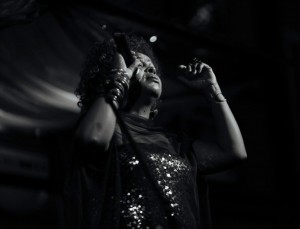
Photography: Safidy Andrianantenaina
“Monika’s back!” cried the announcement by the Alliance Française in Tamatave, Madagascar’s principal port. The previous year when the French cultural organization invited Monika Njava to perform at Ocean 501, city’s hippest scene, she packed out the spacious premises. So fans were urged to reserve early for this year’s show.
Indeed, an eager Friday-night crowd filled the beachfront bar. As Indian Ocean waves crashed in the background they waited expectantly for Monika and her all-star group. Accompanied by guitarist Joël Rabesolo, Monika presented a jazz-tinged repertoire – as always deeply rooted in the traditional music of Southwest Madagascar. And propelled by new drum discovery Bolo Rakoto David and the ultra-grooving Zix Mpamanga on bass, the backing trio rocked hard. Fired up by this horsepower Monika entirely justified the Alliance Française’s evocation of Tina Turner.
Among the evening’s highlights were Joël’s to-Mars-and-back improvisations on “Belina” and Bolo’s stunning, impromptu drum solo during a five-minute power cut (not uncommon in this part of the world). However, for Monika’s die-hard followers, the most memorable moments were undoubtedly the sing-along hits, “Ravola”, “Reolo” and “Mausole”.
Monika Njava & Theo “Mikéa” honor Félicien
Fans of Malagasy singer Theo Rakotovao got an extra Valentine’s Day gift at Theo’s February 14th concert, which took place at the CCESCA hall in Antananarivo, Madagascar’s capital city. When the star singer-songwriter announced his surprise guest, the sell-out crowd of 750 erupted in screams. Monika Njava then came onstage to join Theo in an extended version of the duet “Iza”.
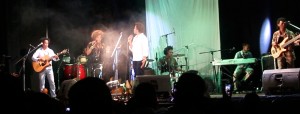
But this wasn’t just any of Theo’s numerous hits. The founder of the celebrated group Mikéa released “Iza” in November as a duet with the young singer Félicien Rakotomalala, immediately producing a monster hit. The 19-year old had just rocketed to stardom after thrashing the competition on the Kopi Kolé talent show. “Iza” boosted Félicien’s celebrity even further, pointing the way towards a stellar career. Yet more drama was to come. In mid-January cyclone Chedza brought torrential rain to Madagascar. The ensuing floods and landslides tragically claimed the lives of around 50 people, one of them Félicien. This triggered a massive outpouring of grief across the island of 22 million.
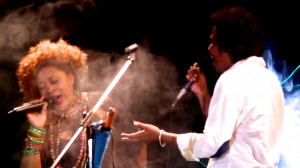
It also left Theo with a dilemma: how best to honor the memory of Félicien at his first show of 2015. Without exception, every Malagasy singer would have jumped at the chance to fill in the missing voice. But for Theo, there was only one artist capable of taking on this weighty responsibility. His choice, and the wild reaction of the audience, confirmed Monika Njava as the voice of Madagascar.
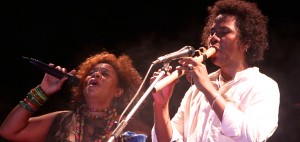
Onstage with Deep Forest
Monika Njava was first invited to work with Deep Forest on the album Comparsa, which went on to sell over a million copies worldwide. Since then she has performed with the group in numerous countries around the globe. On 26 & 27 October Monika appeared with Deep Forest as featured vocalist for two spectacular shows in Santiago, Chile.
Afropop Worldwide radio
Hosted by one of Africa’s best-loved broadcast personalities, Georges Collinet, and presented by Banning Eyre of Afropop Worldwide, the radio show is distributed by Public Radio International to over 115 radio stations in the US, as well as stations in Europe and Africa.
In “Beko ‘n’ Blues in Southwest Madagascar” Banning travels to the Red Island and interviews Monika Njava about the origins of her music and her current projects.
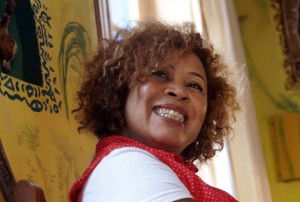
Photo: Banning Eyre 2014
Banning Eyre, Afropop Worldwide
BIOGRAPHY | HAIZINA | PRESS | PHOTOS
Celebrated across Madagascar as the national diva, Monika Njava is known worldwide through her work with Njava, Deep Forest, Island Jazz and Toko Telo. In these groups and on her solo album Haizina, hear why Monika Njava is the voice of Madagascar.
Biography
Musical familyGrowing up on the island of Madagascar in the southwest port of Morondava, Monika Njava was one of fifteen siblings in a very musical family. She began performing with her older brothers as lead vocalist at fourteen. Influenced by the traditional music of the local Bara and Antandroy cultures, Monika was also listening to Miriam Makeba and American soul. Makeba, Aretha Franklin and Tina Turner made a lasting impression on Monika. “They are the three great voices that have marked my life,” she says.
National fame
Heading south to the larger city of Toliara at eighteen she started her own group, performing in town and the surrounding villages. At the same time she opened a small snack bar featuring live music. This eventually grew into a real club, Galeha Dance, which is remembered in Toliara to this day.
With the release of the hit song “Mausole”, Monika became a national celebrity. An attack on the money and power of elites, it was banned from the radio by the government. But this didn’t stop her from touring the entire island and becoming known as Madagascar’s greatest singer – with a reputation for exploding on stage. “The song had a big effect on people,” recounts Monika. “It’s from that time that I really started to transmit emotion to the audience.”
Njava
Moving to Europe in 1991 she and four siblings formed the group Njava with Monika on lead vocals. “We were creating our own musical style,” she says, “and I developed a special identity with a vocal timbre based on the Antandroy and Bara traditions.”
A big break came in 1992 when Njava won the “Prix media” from Radio France Internationale. This led to a world tour of major festivals (Womad, Transmusicale, Africa Festival and others) and a contract with EMI records. Two superlative albums were released, Vetse and Source. Monika recounts, “I met great artists and had the immense pleasure of sharing the stage with one of my idols, Miriam Makeba.”
Platinum album
Meanwhile, Monika began working with the group Deep Forest on the platinum album Comparsa (Sony Music) and joined the band on its subsequent world tour. She also added her voice to soundtracks for documentaries and ads (Toumaii, Skoda).
In 2003 Monika and her sister Lala established a foundation to help poor women in their ancestral village of Vohipeno. To raise funds they created the a capella group Dames D’amour. An album, Partages, was recorded and released in 2005. In addition to these activities, Monika wrote and published the Njava Cookbook. “It’s a homage to my mother,” she explains. The recipes, like her music, mix tradition with broader influences.
Current projects
Monika’s album, Haizina (Darkness), marked her return as a solo artist. As uncompromising as ever, she sings about the poverty, injustice and corruption suffered by her people. Supporting her powerful voice are the rhythms of southern Madagascar flavored by the rock and soul she grew up with. As the title hints, the album is a very personal one for Monika. She adds, “It’s the fulfillment of a dream.”
The launch in 2014 of the group Island Jazz started an exciting new chapter in Monika’s career. Working with Linley Marthe, considered by many to be the world’s best jazz bassist, and the phenomenal guitarist Joël Rabesolo, she is once again proving that she is the voice of Madagascar.
Monika's most recent project, Malagasy supergroup Toko Telo, released its first album, Toy Raha Toy, in 2017. It quickly climbed to #1 on several world music charts. A second CD, Diavola, came out in 2018. The trio includes Joël Rabesolo and D'Gary, Madagascar's most well known artist.
Haizina
InfluencesIn Haizina (Darkness) you’ll hear a unique blend of Malagasy and Western musical influences that have had a great impact on Monika Njava over the years. Yet this mixture is not simply a pastiche. “The decisions about what musical style to use,” Monika says, “grew out of the identity of each song – its melody and lyrics.”
The rhythm and vocal style are deeply rooted in the beko music of the Antandroy and Mahafaly peoples of southern Madagascar where Monika grew up. “From this basis,” she explains, “we worked to integrate modern instruments and Western influences, especially pop and soul.”
This can be clearly heard, for example, in the variety of guitar styles on the album, from marovany to Memphis. Also in the way a classical string quartet contrasts with the lokanga, a three-stringed fiddle from the Antandroy region.
Lyrics
The primary lyricist and composer on the album, Monika Njava wrote the lyrics for half the songs and collaborated on the rest. The exception is “Mausolée”, a reprise of the massive Malagasy hit she originally recorded with the composer Backom.
Monika sings about the poverty, injustice and corruption suffered by her people. The pain of a torn family. The destructive power of money. The battle of women to overcome the trauma of domestic violence. Where does this focus on life’s hardships – personal, social and political – come from? She explains that for her, music is a way to share suffering, to communicate. “I am sensitive to the subjects that touch most people. As an artist I’m not directly engaged in politics. But I don’t hesitate to use my music to denounce the political problems in my country.”
Haizina features a number of different Malagasy dialects. Antandroy, Antanosy and Mahafaly from the southwest of the island where Monika grew up. Antemoro spoken in the southeast where her parents came from. Merina from the central highlands, the “official” dialect understood by almost all Malagasy. “And some French,” she says, “for the sauce.”
Musicians
Recorded on two different continents with musicians from three, Haizina is a truly international project. In addition to vocalist and co-producer Monika Njava, there are a large number of artists from Madagascar. They include guitarist/bassist/co-arranger Christian Ravalison and drummer/percussionist Pata Njava. Chrysanthe Velomijoro plays lokanga violin. There are two guest vocalists: Remanindry, who also plays lokanga, and Gilberto Moravalo, who accompanies himself on guitar and mandoliny. Backing vocals are by Vonihantamalala Ramparany, Lala Njava, Mamitiana Beby Matio, Haingoarilanto Brunette Matio and Thierry Reydellet.
Four Belgian musicians contribute to the project. Dirk Degroef plays electric guitar and Quentin Dujardin plays acoustic guitar and ukulele. They are joined by Johan Vandendriessche on saxophones and trumpeter Carlo Nardozza. Rounding out the team are three Americans. Co-producer and co-arranger Daniel Brandt also plays keyboards. Strings are arranged by Cal Scott and performed by Adam LaMotte.
Photography
To visually express the themes and atmosphere of Haizina, and to highlight her return as a solo artist, Monika Njava worked closely with photographer and designer Jérôme Hubert. “I have always been attracted by black and white photography,” Monika explains. “I already knew the direction the album was going in, so it was clear what kind of images it needed. During shooting I was deeply inside the music, thinking about my album, my songs, what they meant.”
“For me the project was something very profound,” Jérôme recounts. “I had independently come up with the idea of black and white, somewhat in the style of classic jazz portraits of the 1950′s. What I like about the Haizina photos is that you see the trust between us, being at ease. At the same time she knew what she wanted, which helped to guide me.”
Press
“Her powerful voice and explosive presence radiate pure emotion...”Kultur - Zeitschrift für Kultur und Gesellschaft
“A musician who seems to know everyone told me that Monika (whom I’d never heard of) was ‘The voice of Madagascar’. Four weeks later when we left, I knew what he meant.”
Banning Eyre, Afropop Worldwide
“A great lady of music. The concerts offered by the diva were always dates not to be missed.”
La Vérité
“Monika Njava as high priestess. The hall was quickly conquered by the singer with stunning theatricality.”
L’Express de Madagascar
“Monika Njava eternal. A feast for the ears, but also for the eyes. Not everyone gets a chance to see such alchemy. An unforgettable moment.”
L’Express de Madagascar “Monika Njava…exceptional concert, exceptional voice.”
Tananalife.com
“Professionalism up to the fingertips and an outstanding performance. A great artist who brings a personal touch to each of her songs.”
Midi-Madagasikara
Haizina
“The recording is crystalline. Monika has a full, torchy alto voice with a bit of rasp on the edge. Haizina reflects the true fusion of cultures that she embodies.”
Veebeejeebee’s
“She has great vocals and Ravola (Money) is an awesome video. Monika’s music has substance and she has a passion to ensure that there is a better Madagascar. Check out the video Reolo (The People).”
DiscoveringAfricaNetwork.com
“Monika, talented and perfectionist in the concert presentation of her new album Haizina and her national tour.”
News Mada
“Her new album Haizina allows her to show her true personality. It is an opus of well-crafted compositions.”
Midi-Madagasikara

